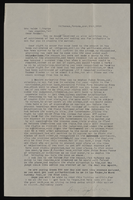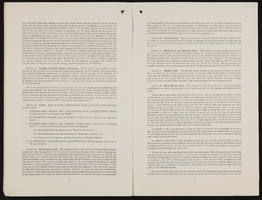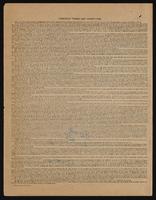Search the Special Collections and Archives Portal
Search Results
Stella Champo Iaconis Collection of Helldorado Photographs
Identifier
Abstract
The Stella Champo Iaconis Collection of Helldorado Photographs (approximately 1934-1940) contains four black-and-white photographic prints of the Helldorado Days celebration held in Las Vegas, Nevada. Images depict people celebrating at the Apache Bar in downtown Las Vegas.
Archival Collection
Betty Henderson Professional Papers
Identifier
Abstract
The Betty Henderson Professional Papers (1963-1985) are comprised of materials produced by Betty Henderson in her capacity as a private music teacher in Las Vegas, Nevada and as a member of the Nevada Music Teachers Association (NMTA). The collection includes scrapbooks of concert programs and NMTA events, materials from Henderson's experiences in Europe as a People-to-People ambassador with the Music Teachers National Association, and recordings on reel-to-reel tapes of concerts Henderson performed in or judged.
Archival Collection
Apolonio Sauceda Scrapbooks
Identifier
Abstract
The Apolonio Sauceda Scrapbooks (1973-2010) document Apolonio "Loney" Sauceda's acting career and his work with the Nevada Association for Latin Americans (NALA) in Las Vegas, Nevada. Two scrapbooks document Sauceda's career as an actor and contain photographs of Sauceda on set, at premieres, with other actors, and depict movie sets at well-known Las Vegas hotels and casinos in the 1980s and 1990s. Newspaper clippings accompany many of the photographs and provide details about locations, major actors, or the producers for each film. The third scrapbook is compiled of newspaper clippings that document the local Las Vegas, Nevada Latinx community and NALA events in the 1970s, ranging from political activism, labor strikes, beauty pageants, and religious gatherings.
Archival Collection
Katherine A. Spilde Papers on Native American Gaming
Identifier
Abstract
The Katherine A. Spilde Papers on Native American Gaming include materials collected by anthropologist Katherine Spilde about Native American gaming and the greater gaming industry. The materials date from 1789 to 2015, with the bulk of materials dating from 1995 to 2010. Materials dating from the eighteenth and nineteenth centuries are reproductions of key court opinions and treaties concerning Native American rights and sovereignty. The majority of the materials document Native American gaming following the passage of the 1988 Indian Gaming Regulatory Act (IGRA). The papers detail Native American gaming enterprises both on and off reservations, the socioeconomic impact of gaming, and the legislative history of Native American gaming in the United States. The papers include research and subject files created by Dr. Spilde during her employment with the National Gambling Impact Study Commission (NGISC), the National Indian Gaming Association (NIGA), and the Harvard Project on American Indian Economic Development (HPAIED). The collection includes socioeconomic reports; testimonies; correspondence; memos; press releases; photographs; audiovisual materials; promotional materials from casinos and tourist attractions; brochures; fact sheets; summaries; booklets; pamphlets; advertisements; tourism materials; journal articles; legal briefs; legislative documents; court opinions; Dr. Spilde’s notes; presentations; packets, agenda, schedules, and itineraries from conferences; periodicals; Native American and community newspapers; and newspaper articles. The collection includes materials about over one hundred federally recognized Native American nations. Also included are materials that document the socioeconomic impact of gaming, the international gaming industry, criminal activities related to gaming, advertising about gaming and casinos, lotteries, internet gaming, compulsive gambling, and bankruptcy as a result of gambling.
Archival Collection

Correspondence, Levi Syphus to Sadie George
Date
Archival Collection
Description
Text

Transcript of interview with Carl Ciliax by Gary Wood, March 8, 1980
Date
Archival Collection
Description
On March 8, 1980, Gary Wood interviewed Carl Ciliax (born 1941 in Las Vegas, Nevada) about his experiences living in Nevada. Ciliax first describes his family history, his early interests in wildlife, and his background and education in artwork. Ciliax then discusses his early experiences in hunting and his eventual interest in conservationism and preservation, including his involvement with organizations that sought the protection of desert bighorn sheep and the protection of wildlife in general. The two talk more about wildlife, the early development of Las Vegas, and the effects of the atomic testing. The interview concludes with Ciliax’s recollection of recreational activities and some of his thoughts on conservationism.
Text

Transcript of interview with Sonja Saltman by Barbara Tabach, August 18, 2015
Date
Archival Collection
Description
Included in this oral history are reminiscences of Sonja Saltman's personal non-Jewish heritage in Austria, the importance of her grandmother in her life, and how she recalls becoming part of the Jewish community.
Sonja Saltman is a psychologist and philanthropist in Las Vegas, Nevada. She is executive director and co-founder of the Existential Humanistic Institute, a non-profit organization based in San Francisco, California that offers training in existential-humanistic therapy and theory. In 2003 Sonja and her husband Michael Saltman founded the Saltman Center for Conflict Resolution at the University of Nevada, Las Vegas (UNLV) William S. Boyd School of Law. The Saltman Center is focused on research, teaching, and public service related to "the advanced study of the nature of conflict and how to resolve it." A native of Austria, Sonja Saltman also serves as the Honorary Consul for Austria in Las Vegas. The Saltmans are involved with multiple charitable organizations and initiatives, both locally and abroad. Sonja Saltman has served on the boards of the Anti-Defamation League, Nevada Women's Philanthropy, and the Black Mountain Institute. Projects that the couple has supported include the rebuilding of homes and bridges is Bosnia, and Streetball Hafla, a basketball program to improve relations between Jewish and Arab teenagers in Israel. In 2014 Sonja and Michael Saltman were recognized as Distinguished Nevadans by the Nevada System of Higher Education. Included in this oral history are reminiscences of her personal non-Jewish heritage in Austrian, the importance of her grandmother in her life, and how she recalls becoming part of the Jewish community.
Text



